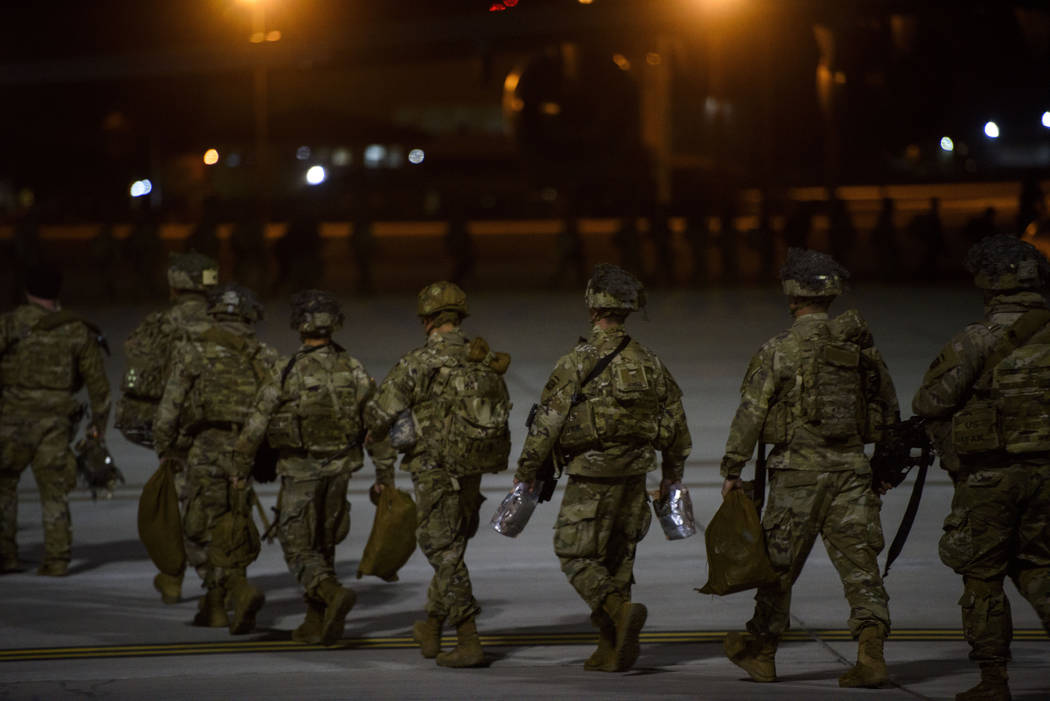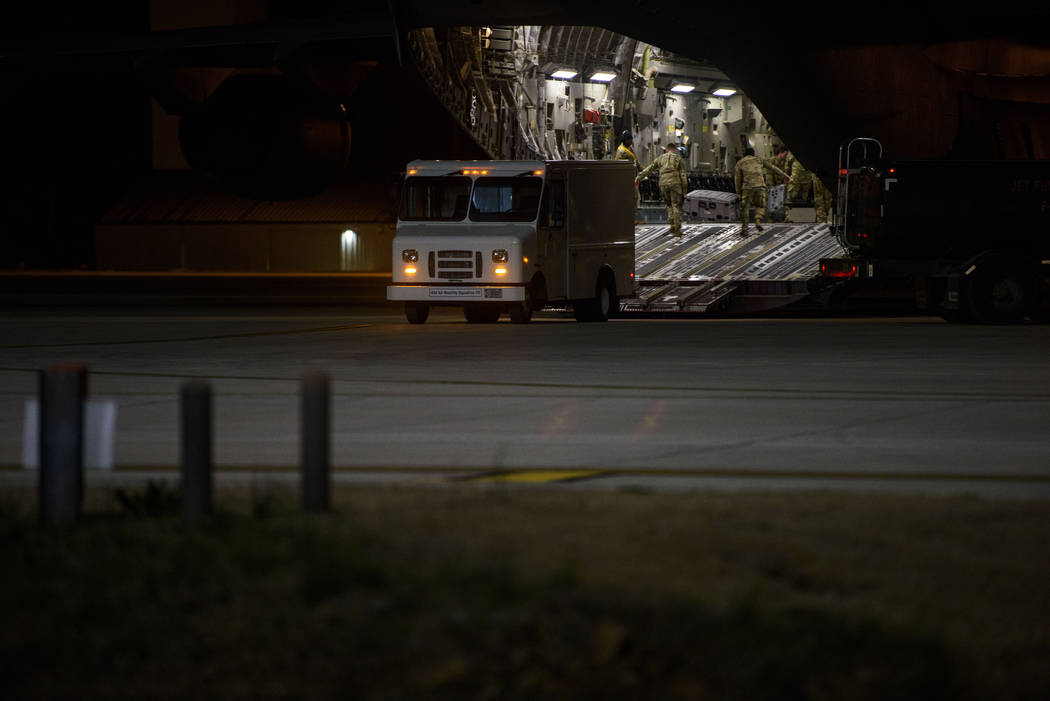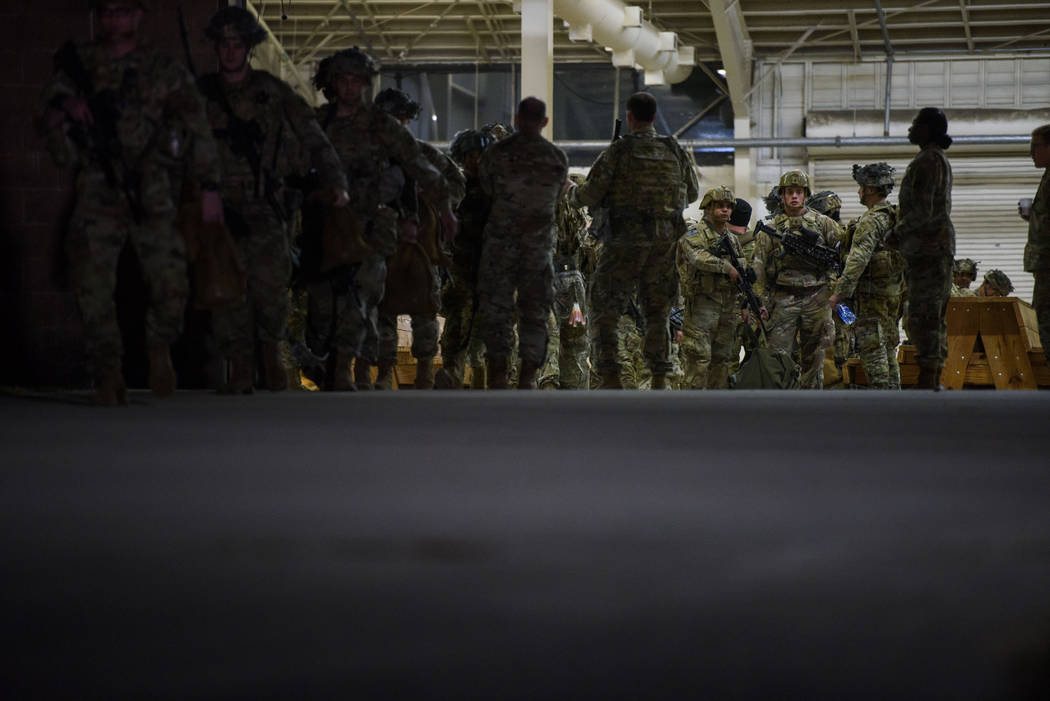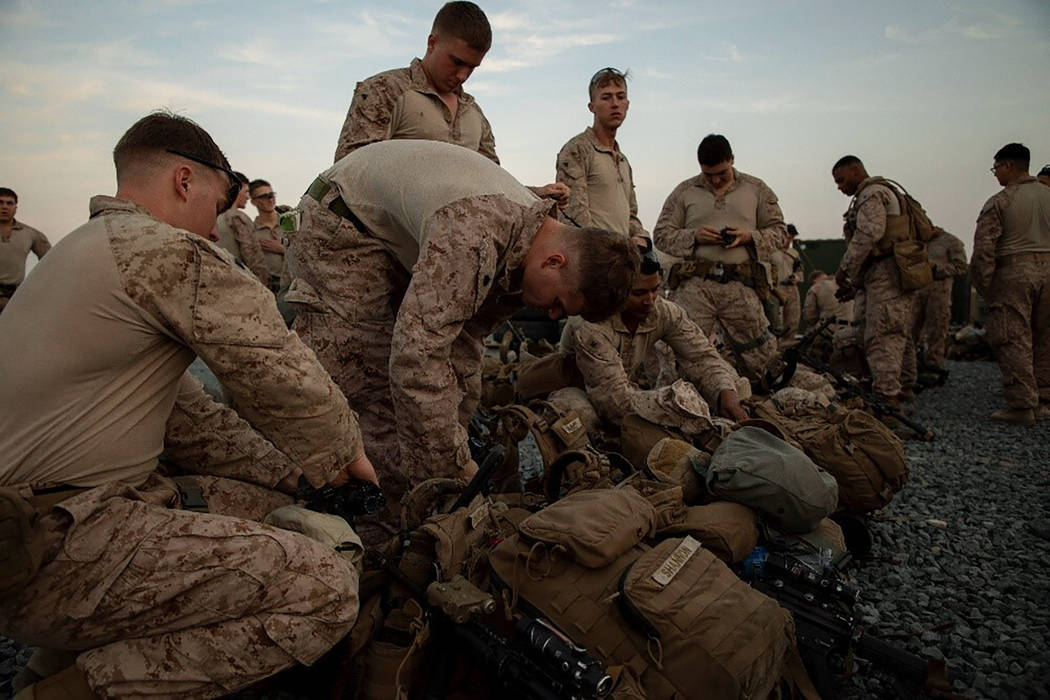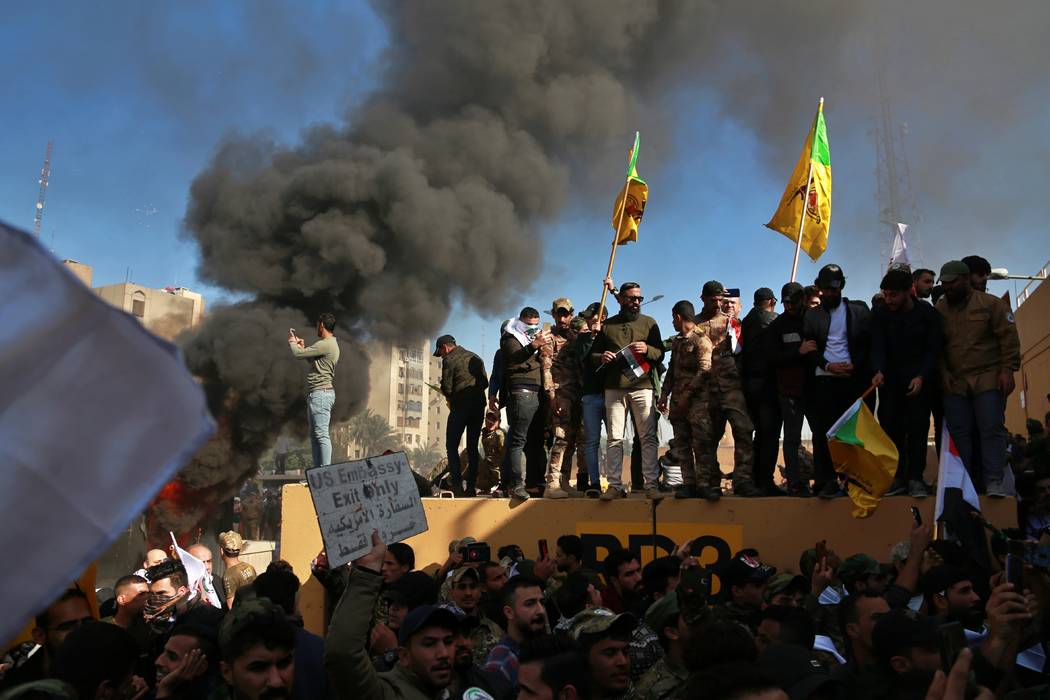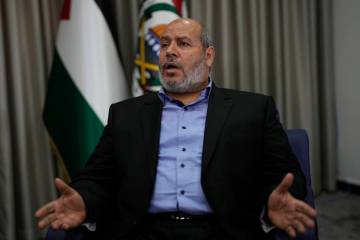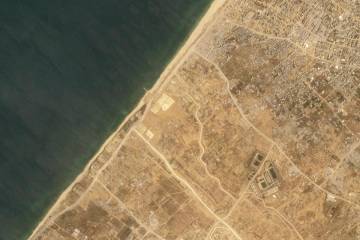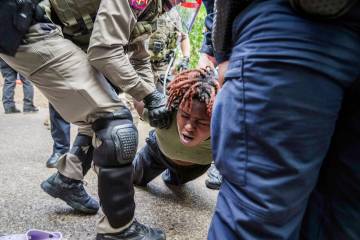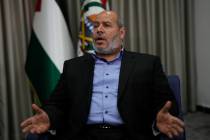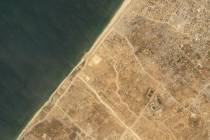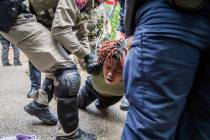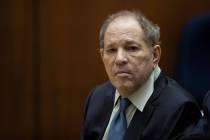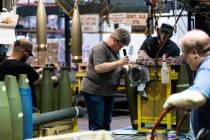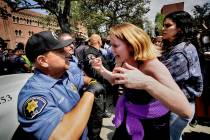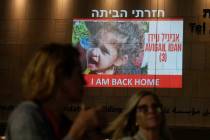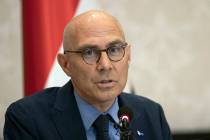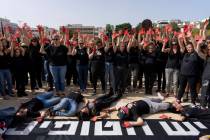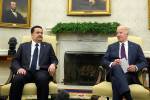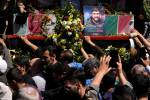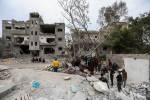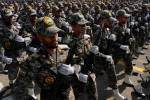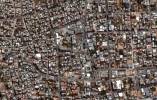2 days of clashes at US embassy end as Iran-backed militia leaves
WASHINGTON — Charging that Iran was “fully responsible” for an attack on the U.S. Embassy in Iraq, President Donald Trump ordered about 750 U.S. soldiers deployed to the Middle East as about 3,000 more prepared for possible deployment in the next several days.
No U.S. casualties or evacuations were reported after the attack Tuesday by dozens of Iran-supported militiamen. U.S. Marines were sent from Kuwait to reinforce the compound.
Defense Secretary Mark Esper said Tuesday night that “in response to recent events” in Iraq, and at Trump’s direction, he authorized the immediate deployment of the infantry battalion from the Army’s 82nd Airborne Division at Fort Bragg, North Carolina. He did not specify the soldiers’ destination, but a U.S. official familiar with the decision said they will go to Kuwait.
“This deployment is an appropriate and precautionary action taken in response to increased threat levels against U.S. personnel and facilities, such as we witnessed in Baghdad today,” Esper said in a written statement.
Additional soldiers from the 82nd Airborne’s quick-deployment brigade, known officially as its Immediate Response Force, were prepared to deploy, Esper said. The U.S. official, who provided unreleased details on condition of anonymity, said the full brigade of about 4,000 soldiers may deploy.
The 750 soldiers deploying immediately were in addition to 14,000 U.S. troops who had deployed to the Gulf region since May in response to concerns about Iranian aggression, including its alleged sabotage of commercial shipping in the Persian Gulf. At the time of the attack the U.S. had about 5,200 troops in Iraq, mainly to train Iraqi forces and help them combat Islamic State extremists.
The breach of the U.S. Embassy compound in Baghdad on Tuesday was a stark demonstration that Iran can still strike at American interests despite Trump’s economic pressure campaign. It also revealed growing strains between Washington and Baghdad, raising questions about the future of the U.S. military mission there.
Militia withdraws
Iran-backed militiamen withdrew from the U.S. Embassy compound in Baghdad on Wednesday after two days of clashes with American security forces, but U.S.-Iran tensions remain high and could spill over into further violence.
The withdrawal followed calls from the government and senior militia leaders. It ended a two-day crisis marked by the breach of the largest and one of the most heavily fortified U.S. diplomatic missions in the world. The attack prompted the Pentagon to send hundreds of additional troops to the Middle East.
....Iran will be held fully responsible for lives lost, or damage incurred, at any of our facilities. They will pay a very BIG PRICE! This is not a Warning, it is a Threat. Happy New Year!
— Donald J. Trump (@realDonaldTrump) December 31, 2019
“They will pay a very BIG PRICE! This is not a Warning, it is a Threat. Happy New Year!” Trump tweeted Tuesday afternoon, though it was unclear whether his “threat” meant military retaliation. He thanked top Iraqi government leaders for their “rapid response upon request.”
American airstrikes on Sunday killed 25 fighters of an Iran-backed militia in Iraq, the Kataeb Hezbollah. The U.S. said those strikes were in retaliation for last week’s killing of an American contractor and the wounding of American and Iraqi troops in a rocket attack on an Iraqi military base that the U.S. blamed on the militia. The American strikes angered the Iraqi government, which called them an unjustified violation of its sovereignty.
While blaming Iran for the embassy breach, Trump also called on Iraq to protect the diplomatic mission.
“Iran killed an American contractor, wounding many,” he tweeted from his estate in Florida. “We strongly responded, and always will. Now Iran is orchestrating an attack on the U.S. Embassy in Iraq. They will be held fully responsible. In addition, we expect Iraq to use its forces to protect the Embassy, and so notified!”
Singles out Iran
Even as Trump has argued for removing U.S. troops from Mideast conflicts, he also has singled out Iran as a malign influence in the region. After withdrawing the U.S. in 2018 from an international agreement that exchanged an easing of sanctions for curbs on Iran’s nuclear program, Trump ratcheted up sanctions.
Those economic penalties, including a virtual shut-off of Iranian oil exports, are aimed at forcing Iran to negotiate a broader nuclear deal. But critics say that pressure has pushed Iranian leaders into countering with a variety of military attacks in the Gulf.
Until Sunday’s U.S. airstrikes, Trump had been measured in his response to Iranian provocations. In June, he abruptly called off U.S. military strikes on Iranian targets in retaliation for the downing of an American drone.
Trump miscalculation alleged
Robert Ford, a retired U.S. diplomat who served five years in Baghdad and then became ambassador in Syria, said Iran’s allies in the Iraqi parliament may be able to harness any surge in anger among Iraqis toward the United States to force U.S. troops to leave the country. Ford said Trump miscalculated by approving Sunday’s airstrikes on Kataeb Hezbollah positions in Iraq and Syria — strikes that drew a public rebuke from the Iraqi government and seem to have triggered Tuesday’s embassy attack.
“The Americans fell into the Iranian trap,” Ford said, with airstrikes that turned some Iraqi anger toward the U.S. and away from Iran and the increasingly unpopular Iranian-backed Shiite militias.
The tense situation in Baghdad appeared to upset Trump’s vacation routine in Florida, where he is spending the holidays.
Trump spent just under an hour at his private golf club in West Palm Beach before returning to his Mar-a-Lago resort in nearby Palm Beach. He had spent nearly six hours at his golf club on each of the previous two days. Trump spoke with Iraqi Prime Minister Adel Abdul-Mahdi and emphasized the need for Iraq to protect Americans and their facilities in the country, said White House spokesman Hogan Gidley.
Trump is under pressure from some in Congress to take a hard-line approach to Iranian aggression, which the United States says included an unprecedented drone and missile attack on the heart of Saudi Arabia’s oil industry in September. More recently, Iran-backed militias in Iraq have conducted numerous rocket attacks on bases hosting U.S. forces.
Sen. Tom Cotton, an Arkansas Republican and supporter of Trump’s Iran policy, called the embassy breach “yet another reckless escalation” by Iran.
Main buildings not entered
Tuesday’s attack was carried out by members of the Iran-supported Kataeb Hezbollah militia. Dozens of militiamen and their supporters smashed a main door to the compound and set fire to a reception area, but they did not enter the main buildings.
Sen. Bob Menendez of New Jersey, senior Democrat on the Senate Foreign Relations Committee, blamed Iran for the episode and faulted Trump for his “maximum pressure” campaign against Iran.
“The results so far have been more threats against international commerce, emboldened and more violent proxy attacks across the Middle East, and now, the death of an American citizen in Iraq,” Menendez said, referring to the rocket attack last week.
By early evening Tuesday, the mob had retreated from the compound but set up several tents outside for an intended sit-in. Dozens of yellow flags belonging to Iran-backed Shiite militias fluttered atop the reception area and were plastered along the embassy’s concrete wall along with anti-U.S. graffiti. American Apache helicopters flew overhead and dropped flares over the area in what the U.S. military called a “show of force.”
Iran-backed militiamen withdrew from the U.S. Embassy compound in Baghdad on Wednesday after two days of clashes with American security forces, but U.S.-Iran tensions remain high and could spill over into further violence.
The withdrawal followed calls from the government and senior militia leaders. It ended a two-day crisis marked by the breach of the largest and one of the most heavily fortified U.S. diplomatic missions in the world. The attack prompted the Pentagon to send hundreds of additional troops to the Middle East.
In an orchestrated assault, hundreds of militiamen and their supporters broke into the embassy compound, destroying a reception area, smashing windows and spraying graffiti on walls to protest U.S. airstrikes against an Iran-backed militia over the weekend that killed 25 fighters.
The U.S. blamed the militia for a rocket attack on an Iraqi military base in the northern city of Kirkuk last week that killed a U.S. contractor.
The protesters set up a tent camp overnight and on Wednesday set fire to the reception area and hurled stones at U.S. Marines guarding the compound, who responded with tear gas. There were no injuries on either side and no American staff were evacuated from the compound.
The Popular Mobilization Forces, an umbrella group of state-allied militias — many backed by Iran — called on its supporters to withdraw in response to an appeal by the Iraqi government, saying “your message has been received.”
Move to other side of Tigris
By late afternoon the tents had been taken down and the protesters relocated to the opposite side of the Tigris River, outside the so-called Green Zone housing government offices and foreign embassies. U.S. Apache helicopters circled overhead.
“After achieving the intended aim, we pulled out from this place triumphantly,” said Fadhil al-Gezzi, a militia supporter. “We rubbed America’s nose in the dirt.”
Kataeb Hezbollah, the Iran-backed militia targeted by the U.S. airstrikes, initially refused to leave but later bowed to demands to disperse. The militia is separate from the Hezbollah militant group in Lebanon, though both are backed by Iran.
“We don’t care about these planes that are flying over the heads of the picketers. Neither do we care about the news that America will bring Marines,” said Mohammed Mohy, a spokesman for Kataeb Hezbollah. “On the contrary, this shows a psychological defeat and a big mental breakdown that the American administration is suffering from,” he said, before withdrawing from the area.
US sanctions root of protests
The violence came as Iran and its allies across the region have faced unprecedented mass protests in recent months and heavy U.S. sanctions have cratered Iran’s economy.
Iraq has been gripped by anti-government protests since October fueled by anger at widespread corruption and economic mismanagement, as well as Iran’s heavy influence over the country’s affairs. Those protesters were not involved in the embassy attack.
Trump sending 750 troops
President Donald Trump blamed Iran for the attack on the embassy and the Pentagon dispatched an infantry battalion of about 750 soldiers to the Middle East. A U.S. official familiar with the decision said they would go to Kuwait.
Iran denied involvement in the attack on the embassy. Supreme Leader Ayatollah Ali Khamenei was quoted by media as saying that “if the Islamic Republic makes a decision to confront any country, it will do it directly.”
Iran later summoned the Swiss charge d’affaires, who represents American interests in Tehran, to protest what it said was war-mongering by U.S. officials.
Public consular operations at the embassy were suspended and future appointments cancelled, it said in a statement.
Tensions rise
Tensions have steadily risen since Trump withdrew the U.S. from Iran’s 2015 nuclear deal with world powers and embarked on a campaign of maximum pressure through economic sanctions. Iran has responded by abandoning some of its commitments under the deal.
U.S. officials have blamed Iran for the sabotage of oil tankers in the Persian Gulf and a drone attack on Saudi oil facilities in September that caused a spike in world oil prices. But the Trump administration has not responded with direct military action, apparently fearing a wider conflict.
The U.S. has sent more than 14,000 additional troops to the Gulf region since May in response to concerns about Iranian aggression. At the time of the attack, the U.S. had about 5,200 troops in Iraq, mainly to train Iraqi forces and help them combat Islamic State extremists.
The U.S. and Iran have vied for influence over Iraq since the 2003 U.S.-led invasion that toppled Saddam Hussein. Iran has close ties to Iraq’s Shiite majority and major political factions, and its influence has steadily grown since then.
Iran helped to mobilize tens of thousands of mostly Shiite militiamen to battle the Islamic State group when it stormed across northern and western Iraq in 2014 as the armed forces collapsed. The U.S. and Iran both provided vital aid to Iraqi forces, who eventually declared victory over the extremists in December 2017.
PMF influence rises
The political influence of the Popular Mobilization Forces has risen in recent years, and their allies dominate the parliament and the government. That has made them the target of the anti-government protesters, who have attacked Iranian diplomatic missions and the local headquarters of parties affiliated with the militias across southern Iraq.
They have also set up a sprawling protest camp in central Baghdad, and for weeks have been trying to enter the Green Zone. Iraqi security forces have beaten them back with tear gas and live ammunition, killing hundreds.
The militiamen and their supporters, however, were able to quickly enter the Green Zone and mass in front of the embassy, with little if any resistance from authorities.
Iraq’s government vehemently condemned the airstrikes on the militia, saying it violated national sovereignty. But Iran and its allies might have also seen the attack as a way of diverting attention from the anti-government protests.
“Iran has been trying to provoke the U.S. into helping it solve its Iraq problem,” said the Crisis Group, an international think tank. “The Trump administration, by responding to the attacks in Kirkuk and elsewhere with airstrikes, has obliged.”
Folly to keep forces in Iraq
The embassy breach was seen by some analysts as affirming their view that it is folly for the U.S. to keep forces in Iraq after having eliminated the Islamic State group’s territorial hold in the country.
A U.S. withdrawal from Iraq is also a long-term hope of Iran, noted Paul Salem, president of the Washington-based Middle East Institute.
And it’s always possible Trump would “wake up one morning and make that decision” to pull U.S. forces out of Iraq, as he announced earlier with the U.S. military presence in neighboring Syria, Salem said. Trump’s Syria decision triggered the resignation of his first defense secretary, retired Gen. Jim Mattis, but the president later amended his decision and about 1,200 U.S. troops remain in Syria.
Trump’s best weapon with Iran is the one he’s already using — the sanctions, said Salem. He and Ford said Trump would do best to keep resisting Iran’s attempt to turn the Iran-U.S. conflict into a full-blown military one. The administration should also make a point of working with the Iraqi government to deal with the militias, Ford said.
For the president, Iran’s attacks — directly and now through proxies in Iraq — have “been working that nerve,” Salem said. “Now they really have Trump’s attention.”



